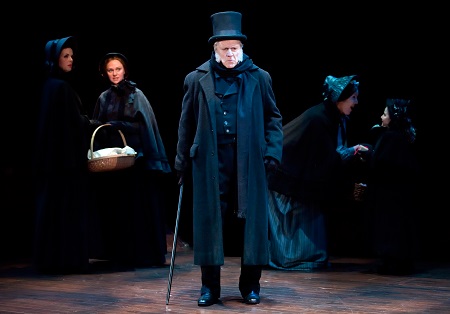Soulpepper’s Christmas Carol is “An Outright Pleasure from Start to Finish”
If “humbug” were a word that people still used, it would come in handy right about now. One doesn’t have to be a miserable soul to feel irritated by Christmas, or at least, skeptical of some of its gifts: the manic shopping, the bad music, the cheap sentiments.
But there’s no denying that some of the traditions are beautiful and satisfying, not least of them the annual viewing of A Christmas Carol by Charles Dickens. Soulpepper has brought back their adaptation by Michael Shamata, and even for the Scroogiest among us, it’s an outright pleasure from start to finish.
This version is what I would call an essential interpretation: not too long, not too showy, it aims straight for the heart of the story and finds its mark with confidence. Shamata relies unselfconsicously on Dickens’s genius for character and dialogue, and doesn’t let anything get in the way of the brilliant writing or the quality of the actors.
Shamata also captures the gothic grandeur of this tale. A Christmas Carol is a heart-warming story (literally, in Scrooge’s case: “No wind that blew was bitterer than he”), but it’s also a ghost story. It’s meant to be creepy, and this production never loses its eerie, haunted glow.
But of all the reasons to love this production (or any interpretation of this story, for that matter), the best by far is Ebenezer Scrooge, played perfectly by Joseph Ziegler. Scrooge isn’t just a dastardly character who gets the greed scared out of him—he’s also a weird and insightful oddball with a deliciously nasty sense of humour and a truly charming giggle, when he’s finally unplugged enough to let it out.
That’s just the beginning of how complex and well-drawn this character is. Dickens repeatedly reminds us that Scrooge is a child on the inside, despite the tough exterior. Scrooge’s bitterness is really just the angry sadness of a young boy who’s been left out by the group, drawn out over a lifetime and reinforced by wealth to look like common sense. A Christmas Carol isn’t short on caricatures, but clearly the author understood Scrooge from the inside out.
Like Scrooge, Dickens grew up poor—his father was condemned to debtor’s prison when he was only 11—and the experience of being sent away from his family to work in a shoe factory remained a vivid and painful memory, long after he became a famous writer.
Scrooge is the villain of Dickens’s own childhood, standing in for the brutal creditors who tore the boy’s family apart and sent his dad to jail (and his mom and siblings along with him) for no other crime than being poor. That’s real trauma, and there’s real anger in this story to go with it: Scrooge deserves the fear and hatred he evokes.
But that’s just one side of the story. Dickens made a lot of money in the end too, and he understands how financial security can become an obsession, if it was once absent. He shows profound sympathy for Scrooge, perhaps most of all when giving voice to the disgust that most people feel for the lonely miser. Tiny Tim is a sad character, but Scrooge is truly heartbreaking.
A Christmas Carol boasts several more fascinating characters: Kevin Bundy makes Mr Fezziwig’s Christmas glee seem truly irrepressible, John Jarvis channels the sorrowful detachment of Jacob Marley and the ghosts, and Oliver Dennis (one of my personal favorites in the company) lets some goofy fun sneak past his brave face as the longsuffering Bob Cratchit. Unfortunately, Dickens didn’t write any great parts for the women in this story, but Deborah Drakeford nonetheless brings poignancy to Mrs. Cratchit’s sadness and frustration at her difficult life.
Getting down to the Young Centre for the Performing Arts, you’ll pass through the Distillery District’s annual Christmas Market and brush shoulders with hundreds of other people navigating the contradictions of the season: beautiful sentiments, all wrapped up and sold at a steep price. Thankfully, the solution waits at the end of the lane—A Christmas Carol rings as clear and true as the holidays were meant to.
Details
- A Christmas Carol runs until December 27 at the Young Centre for the Performing Arts (50 Tank House Lane)
- Shows run every day except Monday (and Christmas!) at 7:30pm, with Wednesday and Sunday matinees at 1:30pm.
- Tickets range from $29 to $89 and can be purchased at the Young Centre box office, online, or by calling 416-866-8666.
Image: Sarah Wilson, Deborah Drakeford, Joseph Ziegler, Maggie Huculak and Sabrina Nardi (2012 production). By Cylla von Tiedemann


3 thoughts on “Review: A Christmas Carol (Soulpepper)”
Comments are closed.